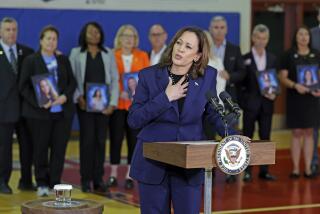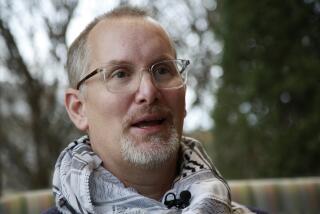Muslim students’ slayings investigated as possible hate crime, FBI says
- Share via
Reporting from Chapel Hill, N.C. — The FBI announced late Thursday that it had opened a preliminary hate-crime investigation into the slayings of three Muslim students in Chapel Hill, N.C.
“The FBI is continuing to provide assistance to the Chapel Hill Police Department to process evidence related to a triple-homicide investigation,” the federal agency said in a statement. “The FBI has also opened a parallel preliminary inquiry to determine whether or not any federal laws were violated related to the case.”
The announcement followed an emotional prayer service on the North Carolina State University campus, where all three had been undergraduates.
Mourners came by the thousands under leaden skies — men in white skullcaps, women in dark head scarves, children dressed in their finest clothes, and college students in jeans.
On the dead winter grass before them lay the caskets of three young Muslim students slain in nearby Chapel Hill this week. They were two newlyweds and the sister of the bride, all shot Tuesday, allegedly by a neighbor enraged over an ongoing parking space dispute, police said.
Few in the gathering of some 5,000 people, Muslims and non-Muslims alike, seemed convinced that Deah Shaddy Barakat, his wife, Yusor Abu-Salha, and her sister Razan Abu-Salha were gunned down simply over a parking spot. The Muslim community has demanded that the killings be investigated as a possible hate crime.
The deaths — family members said police told them the students were shot in the head — have galvanized Muslims worldwide. Photos of the three, with the two women wearing head scarves, rocketed around the world on social media, some under the hashtag #Muslimlivesmatter.
Now, on a bitterly cold winter day, Muslim men bowed and prayed as an imam chanted janazah, or funeral prayers. The mourners’ taqiyah, or skullcaps, brushed the worn grass of a soccer field at N.C. State in silent tribute. Non-Muslim mourners stood with bowed heads.
The only sounds were the sudden stab of a baby’s cry and a northern wind that rustled through the tall pines cloaking the field.
Mohammad Abu-Salha, father of Yusor and Razan, said the families did not seek revenge. “Our children are much more valuable than any revenge,” he said.
But Abu-Salha, a psychiatrist, said he did seek acknowledgment from law enforcement, and from the world at large, that his daughters and son-in-law were killed at least in part because of their faith.
“We have no doubt why they died,” Abu-Salha told the mourners. “This has hate crime written all over it. I will not bend over that. If they [law enforcement] do not listen carefully, then I will yell.”
He added: “I trust law enforcement to do their duty.”
Officials have charged the newlyweds’ neighbor, Craig Stephen Hicks, 46, with three counts of first-degree murder in the deaths of Barakat, 23, Yusor, 21, and Razan, 19.
North Carolina has hate-crime laws for lesser crimes like property damage and assault, but not for first-degree murder, which already carries the most serious possible punishments, a North Carolina legal expert said Thursday.
If a suspect charged with second-degree murder — an intentional but not premeditated killing — was motivated to kill because of the victim’s religion, a judge could slightly increase the prison sentence, said Joseph Kennedy, a University of North Carolina law professor.
But if a killing was intentional and premeditated — first-degree murder — no such hate-crime enhancement exists, and state law does not make specific considerations for religious or racial hatred when a jury considers whether to give a defendant who is found guilty a life sentence or the death penalty, Kennedy said.
Durham County Dist. Atty. Roger Echols, who is prosecuting Hicks, said a hate-crime statute would not come into play in a first-degree murder case such as the one facing Hicks. But he said religious hatred is among the possible motives under investigation in the killings.
“We’ll just have to let the investigation take its course,” Echols said in an interview Thursday.
Neighbors described Hicks, a community college student, as a hulking, menacing figure who confronted neighbors of all races and religions over parking spots and noise. One resident, Samantha Maness, described his hostility as “equal-opportunity anger.”
Abu-Salha said his daughter Yusor had complained of a spiteful neighbor who wore a gun on his hip when he confronted the couple more than once over a parking space. “‘Honest to God,’ she said, ‘He hates us for what we are and how we look,’” Abu-Salha told a Raleigh newspaper.
Barakat was a dental student at the University of North Carolina at Chapel Hill. His wife, whom he married Dec. 27, was to join him in the program next fall. Razan was an honor student in architecture at North Carolina State. Several times, speakers at the service used the words “selflessness” and “beautiful souls” to describe the students.
Barakat helped the homeless, and he and his wife raised money for dental care and dental kits for Syrian refugees in Turkey. Her sister was remembered as a loving, smiling young woman who helped everyone she met.
All three had been undergraduates at North Carolina State. Barakat was a rabid N.C. State Wolfpack basketball fan, and had befriended a Muslim player on the team, Abdul-Malik Abu.
“These children were die-hard Wolfpack,” Abu-Salha told the mourners. He said they were enormously proud of their association with the university.
Nouman Siddiqui, outreach director for the Islamic Assn. of Raleigh, asked the mourners “to let God remove from our hearts hate and ill will.” He lowered his head and said quietly: “These are heavy, heavy times.”
Abu-Salha said the families were devastated by the loss of their high-achieving children, who grew up in the United States and considered themselves as American as anyone. “The pain is indescribable,” he said.
He spoke about Hicks’ Facebook page, where the suspect described his “anti-theism” beliefs. Hicks wrote that organized religions were based on superstition, and were “ignorant and dangerous.”
Abu-Salha pointed out that Hicks posted on his Facebook page how much he “hated faith.”
To the families, Abu-Salha said, fighting hate crimes “is all about making this country, that they loved and where they lived, safe for everyone.” He urged mourners to honor their memories “by living Islam, which means honoring all people on earth.”
“Islam is not what you read in the media and it’s not the ‘American Sniper’ movie,” he said.
When the service ended, several men rushed forward to help carry the caskets, two silver and one white. The three students were to be laid to rest in an Islamic Assn. of Raleigh cemetery in nearby Wendell, N.C.
The men hoisted and carried the caskets to waiting cars. Other men and boys followed, chanting and shouting as they left the grounds of a campus the three young students had cherished.
Follow @davidzucchino and @mattpearce for national news
More to Read
Sign up for Essential California
The most important California stories and recommendations in your inbox every morning.
You may occasionally receive promotional content from the Los Angeles Times.















